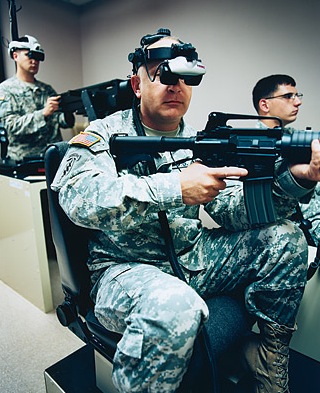
Fort Campbell troops recover from war / Gareth McConnell
Tough story in the Clarksville, Tenn., Leaf-Chronicle this morning about a soldier with PTSD who says he went AWOL, instead of returning to Afghanistan, because of the lack of mental-health services at Fort Campbell, Kentucky. “All I wanted was to be treated,” Specialist Jeff Hanks, who also served in Iraq in 2008, said outside the fort’s gate Thursday as he turned himself in. “Hopefully they’ll listen to me and treat me.” Hanks said he went absent without leave nearly a month ago after his post-traumatic stress disorder and the collapse of his family convinced him he couldn’t get the help he needed in a war zone:
Hanks said he reached out to his commanders while home on leave, but he was met with resistance and delay. He said he was told he would immediately have to go back to Afghanistan.
We wrote about this sad state of affairs at Fort Campbell in the August 16 issue of Time:
The Army has spent $7 million building at Fort Campbell what it calls its first behavioral-health campus (soldiers call it “the mental-health mall”) with a half-dozen new clinics filled with the latest technology for diagnosing and treating posttraumatic stress disorder (PTSD) and traumatic brain injury. The fort’s mental-health staff has grown from 31 in January 2008 to 95 today…But the trend at the base remains clear; the workload per mental-health worker has nearly doubled from 2008 to 2010, jumping from 19 to 32 visits per week.
Additional reporting for that story revealed:
The focus on Fort Campbell’s mental health has been driven, in part, by a 2008 probe that tried to figure out why its 2007 suicide rate was 50 percent higher than the overall Army’s. Outside Army experts found that even as Fort Campbell’s mental-health visits increased fivefold from 2005 to 2007, the staff shrunk from 28 to 18. That led to longer waits between visits and individual troops being seen in clinics beset by “frequent staff turnover,” forcing the soldier to “start over” with a new therapist each visit. The mental-health workload led to poor care and morale, as well as “compassion fatigue,” among counselors. The first recommendation to curb suicides: “address critical behavioral-health shortages.”
The Army’s didn’t care for the attention garnered by the young soldier. “It seems a shame to focus attention on this particular young man on Veterans Day,” a post spokeswoman said in a statement, “when we have 15,000 men and women from the 101st Airborne Division bravely supporting the fight and placing themselves in harm’s way in Afghanistan and Iraq.”


